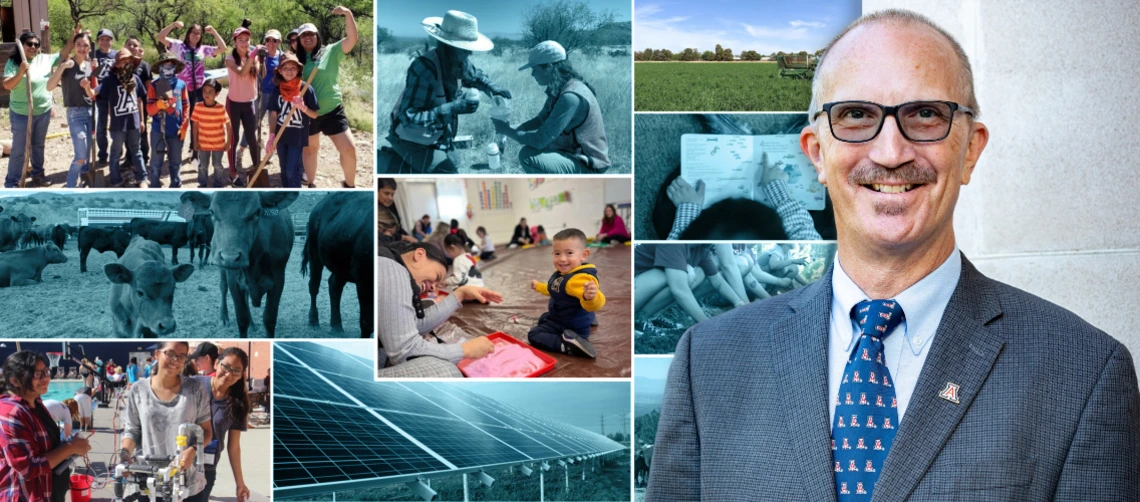Ed Martin Named University Associate Vice President, Cooperative Extension Director
Martin, an irrgation specialist with 30 years of Arizona Extension experience, will contiue leading an effort he launched last year to craft a statewide strategic action plan.

Cooperative Extension
Following a comprehensive and competitive international search, Ed Martin has been named the Associate Vice President and Director of the University of Arizona’s Cooperative Extension.
Martin brings more than 30 years’ experience as an irrigation specialist to the role at a time when Arizona growers and communities face unprecedented challenges in water conservation.
Created through the Smith-Lever Act of 1914, UArizona’s Cooperative Extension brings the science and innovation of the state’s land-grant university to the people of Arizona, with more than 650 employees working in all 15 counties and five tribal nations.
Extension touches lives across the state through early-childhood vision, hearing, and dental screenings; financial literacy education; agricultural research; and 4-H youth development, Martin said.
“The economic and social landscape varies across the state, and UArizona Cooperative Extension collaborates with local partners to improve people’s lives, communities, economies, and the environment,” he said.
“I look forward to continuing our work to meet the needs and addressing the issues facing the great state of Arizona."
Martin first came to the university in 1992, as an extension specialist in irrigation at the Maricopa Agricultural Center—a 2,100-acre research station located 30 miles southwest of Phoenix. His work focused on the efficient and effective management of agricultural irrigation water, developing the Arizona Irrigation Scheduling (AZSCHED) program that helped growers better apply and manage their irrigation water applications.
With more than fifteen years of organizational leadership, Martin has served as associate director for Cooperative Extension’s Agriculture and Natural Resources mission area, and director of Maricopa County’s Cooperative Extension system, as well as the interim director for the statewide Extension organization for the last two years.
In 2021, Martin was inducted into the National Association of County Agricultural Agents’ Hall of Fame.
“Ed Martin’s expertise and existing statewide trust in water is consistent with what our stakeholders tell us is the most important issue in Arizona today,” said Shane Burgess, Vice President for the Division of Agriculture, Life and Veterinary Sciences, and Cooperative Extension.
Economic impact
Martin will lead the organization’s evolving strategic action plan.
Initiated by Martin in 2022, the statewide project is built on two foundational analyses—an economic impact study and a statewide needs assessment survey. The economic study, conducted last year by TEConomy Partners, culminated in a 107-page report detailing the ways Extension touches Arizona families and businesses in every corner of the state.
“The youth who don’t miss school because they are eating healthier thanks to our nutrition programs. Agricultural producers who use fewer pesticides by following our Integrated Pest Management best practices,” Martin said. “Even the homeowner who learns which varieties to plant in their garden and how to implement drip irrigation. All of these have a significant economic impact on our state, county, and local economies.”
With $14.2 million in state funding in 2021, Extension generated an additional $18.4 million in financial support and improved economic productivity by $138.5 million, according to the report.
“These are the impacts that Congress envisioned as benefits to be provided through the formation of the state programs. They constitute a broad and multifaceted array of positive economic and social impacts for Arizona,” TEConomy Partners wrote in its report.
Vision for the future
More than 3,200 Arizonans completed the second pillar of the action plan—a nearly 100 question needs assessment survey planned and executed by the Norton School of Human Ecology’s Community Research, Evaluation, & Development team and led by Michele Walsh, Cooperative Extension Associate Director for Family, Consumer, and Health Sciences.
Topics included health and wellbeing; education and youth development; agriculture; natural resources and environment; as well as community and economic development. Respondents in all 15 counties ranked each issue’s importance on a scale from “extremely” to “not at all.”
Water conservation, quality, and efficiency ranked at the top of the list of concerns, along with drought preparedness. Quality K-12 education and recruitment of quality teachers were in the top five. Other priorities included access to healthy food and prevention of child abuse and domestic violence, the survey showed.
“We have to prepare the people we work with for jobs that don’t even exist yet, and that’s a very difficult thing to do,” Martin said.
“While the needs and challenges in Arizona communities change quickly, the strategic action plan will keep Extension nimble and demonstrate the organization’s intentional service to the people and industries of the state.”
As Associate Vice President and Director of the statewide organization, Martin will maintain offices in both Tucson and Phoenix.

